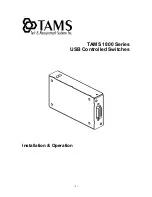
- 4 -
The asset management label is at the lower-right corner of the switch back panel. The label is movable and can be
withdrawn from the device. Users can mark the information such as asset name, category, code and registration date
on the label which helps to improve asset management rate and efficiency.
Figure 1-4 Asset Management Label of the RG-S6220-48XS4QXS V1.XX
External Interface
The RG-S6220-48XS4QXS V1.XX provides the following interfaces:
Universal serial bus (USB) port: This port can connect with USB memory to save logs, host versions, warnings
and other diagnostic messages. Therefore, it is more convenient to upgrade the software version of the switch on
line and save the log information.
To protect the data and avoid device damage, use qualified USB flash disks of good brands. At the same time, the
local USB interface is compatible with most of the USB controllers except some USB flash disks.
Console port: Use RS-232 interface electrical level and standard RJ45 connector. This interface is connected with
the serial port of terminal PC to perform system debugging, configuration, maintenance, management, and host
software uploading.
10/100/1000M RCMI management port: This is an out-band Ethernet port, which uses standard RJ45 connector.
This interface is connected with Ethernet port of a PC to perform program downloading. This interface also
supports data center manageability interface (DCMI) protocol, and users can do remote management and
maintenance for the switch through the interface. Use standard network cable when the interface is connected
with the Ethernet port.
When connected through DCMI protocol, the PC needs to install DCMI client.
For detailed functions and application methods of DCMI, please refer to
Configuration Guide.
SFP+ port: There are 48 10G QSFP+ ports, which support optical modules and DAC copper cables, and are
compatible with 1000Base-X.
QSFP+ port: There are four 40G QSFP+ ports, which support optical modules and DAC copper cables. This port
can work in 4x10 mode.
FC port: There are eight 2G/4G/8G Fibre Channel interfaces (Port 1 to Port 8, also support SFP+)
Indicator
Indicator
Panel
Identification
Status
Meaning
System indicator
Status
Off
The system is not powered up.








































